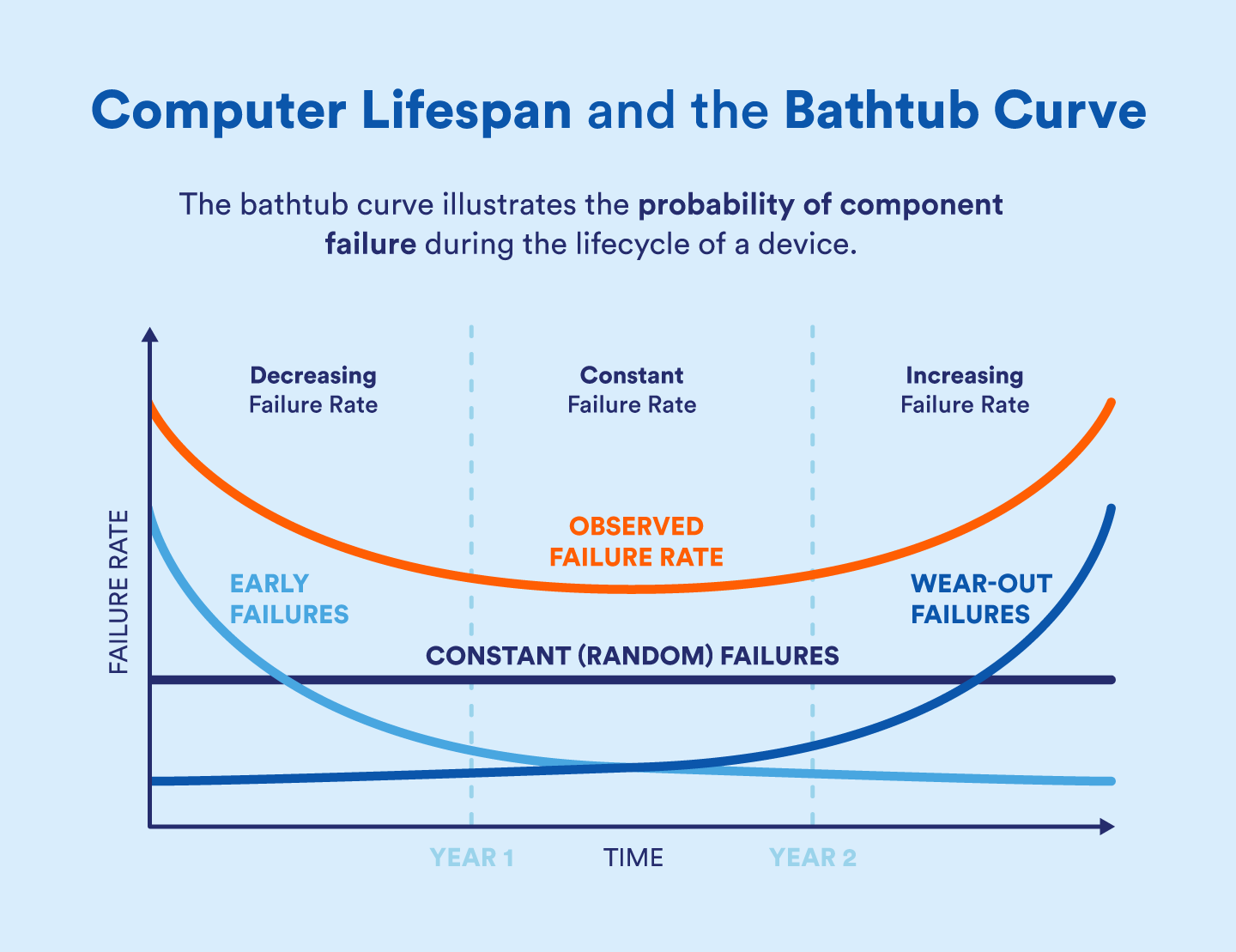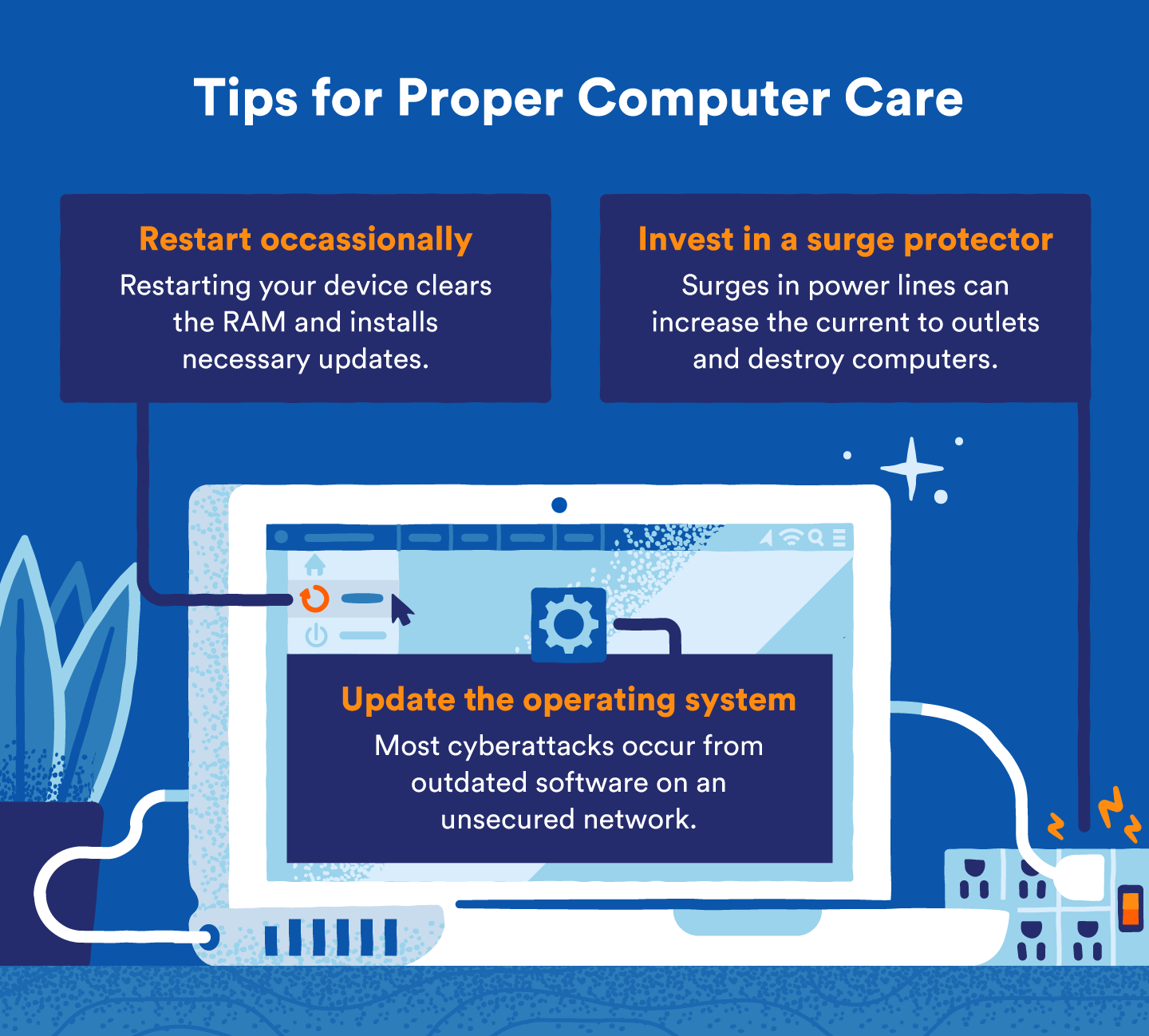As a benchmark, turn new computers off once daily and leave older devices turned on. Although it’s widely accepted that all computers and laptops should be turned off every night, there are some caveats that point to a daily shutdown not being necessary. Even still, when surveying 1,000 Americans about how often they power down their work computer, 37% responded that they do so every night.
Going beyond basic best practices, the decision to keep your PC on or shut it down for the optimal result relies on a few factors. Depending on the age of the computer, usage, concern for wear and tear, antivirus software installed, and automated tasks, the best thing for your device might not be what the majority of people are doing.
If you don’t want the technicalities, ask yourself “Should I turn my computer off at night?” then jump to the flowchart to find out.
Why Does It Matter If I Turn My Computer Off?
Although PCs benefit from an occasional reboot, it’s not always necessary to turn off your computer every night. The right decision is determined by the usage of the computer and concerns with longevity.

The bathtub curve nods to the idea that keeping a new computer on slows down the aging process. This increases the probability of components failing after the warranty is expired. On the other hand, as the computer ages, keeping it on can extend the life cycle by protecting the PC from failure. Components in the mid-life cycle, according to the curve, remain stable and have a neutral probability of failure.
Reasons to Turn Computers off
There are a few reasons the answer to “should I turn my computer off at night?” can be a firm yes. For example, those hyperfocused on security threats while visible online or people especially concerned about the wear of components would answer affirmatively.

Other considerations to turn computers off include:
- You’re in public or on an unsecured network.
- You want to slightly save on your electricity or power bill.
- You don’t want to be disturbed by notifications, fan noise, or blue light.
- You want to slow the wear of components, like the cooling fan and hard disk.
- You house sensitive data and are concerned about the cyber risk of an open connection.
- You perceive value in the charge cycle of your battery.
- You have a new computer and you want to find any faulty hardware while its under warranty.
Reasons to Leave a Computer on
Because leaving a computer turned on can lengthen its lifespan, many choose to opt-out of powering down regularly.

Leaving the device running is also beneficial if:
- You’re a business operating a web server.
- You want to access your computer remotely.
- You want to run background updates, virus scans, backups, or other activities while you’re not using your computer.
- You never want to wait for the PC to start up.
- You have an old computer and you want to extend the lifespan.
- You run an old operating system.
Alternatives to Turning Computers Off
A full shutdown on your machine means that everything is powered down and the internal components are no longer running. When stepping away from the computer for a short time, a full shutdown can be excessive. Alternatively, put the device to sleep, or hibernate in Windows, to put the internal components in a low power mode.
Computer Care FAQs and Tips
Increase the overall lifespan of your computer by taking precautions like avoiding physical damage, restarting the device occasionally, keeping it cool and clean, updating frequently, and investing in a surge protector.

In line with caring for your machine, consider your usage, concern for wear and tear, the age of the computer, and the frequency of tasks performing automatically to make the correct decision on whether or not you should turn off your computer or not at night.
Consider Your Computer Factors
Factors to consider before implementing a routine to power down your PC include:
- Age of the computer: The highest probability of component failure happens when the device is new, and again at the end of its lifecycle, in line with the bathtub curve. Theoretically, that means it’s best to turn new computers off regularly and keep older ones on.
- Usage: If you need remote access to your computer or use it as a server, keep the device on to avoid interruption. If sensitive information is stored on the PC, however, consider turning it off to disconnect to the internet and possible cyber attacks.
- Concern for wear and tear: The lifespan of the cooling fan and hard drive will be reduced, albeit minimally if it’s left on. If the longevity of your computer is the main concern, power it off once per day.
- Frequency of automated tasks: Automated tasks such as scans, updates, and backups can’t take place when the computer is turned off. If you schedule automated tasks, consider leaving the machine on.
Is It Bad to Shut Down Your Computer Every Night?
A frequently used computer that needs to be shut down regularly should only be powered off, at most, once per day. When computers boot from being powered off, there’s a surge of power. Doing so frequently throughout the day can decrease the lifespan of the PC. The best time for a full shutdown is when the computer won’t be in use for an extended period of time.
Does Leaving Your Computer on Damage It?
Leaving your computer on does little damage to modern computers. However, when the computer is on, the fan is working to cool the machine’s components. When it’s running consistently, it will shorten the lifespan slightly. Additionally, external incidents like dropping the device or unexpected power surges while the computer is on can cause significant hardware damage or preventable data loss.

The concern that influences many people in one direction or the other about a regular computer shut down is the risk of cyberattacks. Contrary to what’s widely accepted, these attacks aren’t typically due to the machine being left on or turned off, but because of the lack of antivirus software or a connection to an unsecured network. If you keep your computer online often, occasionally restart the device to clear RAM and satisfy the need to install critical updates and patches.
Methodology: This study was conducted for Panda Security using Google Consumer Surveys. The sample consisted of no less than 1,000 completed responses per question. Post-stratification weighting has been applied to ensure an accurate and reliable representation of the total population. This survey was conducted in May 2020.
Sources: Energy Star | Lifewire






7 comments
When I shut down my Mac at nite I find that it is sometimes on in the morning. Please advise.
ghost
can confirm the only logical answer is its a ghost
Love the computer drawings, props to your artist 🙂
I teach in the mornings at around 8 am to 12 pm but my next round of teaching schedule would be at around 7pm to 10pm. Do I still need to turn my imac off? Since I have at least 7 hours of no teaching schedule in the afternoon or do I just put it on sleep mode?
I am concerned about my electricity and preserving my mac too
Thanks!
If you’re concerned about electricity and preserving your mac, and given that you won’t be using it for 7 hours, I recommend that you turn it off.
Hello! I’m at work browsing your blog from my new apple iphone! Just wanted to say I love reading your blog and look forward to all your posts! Carry on the fantastic work!